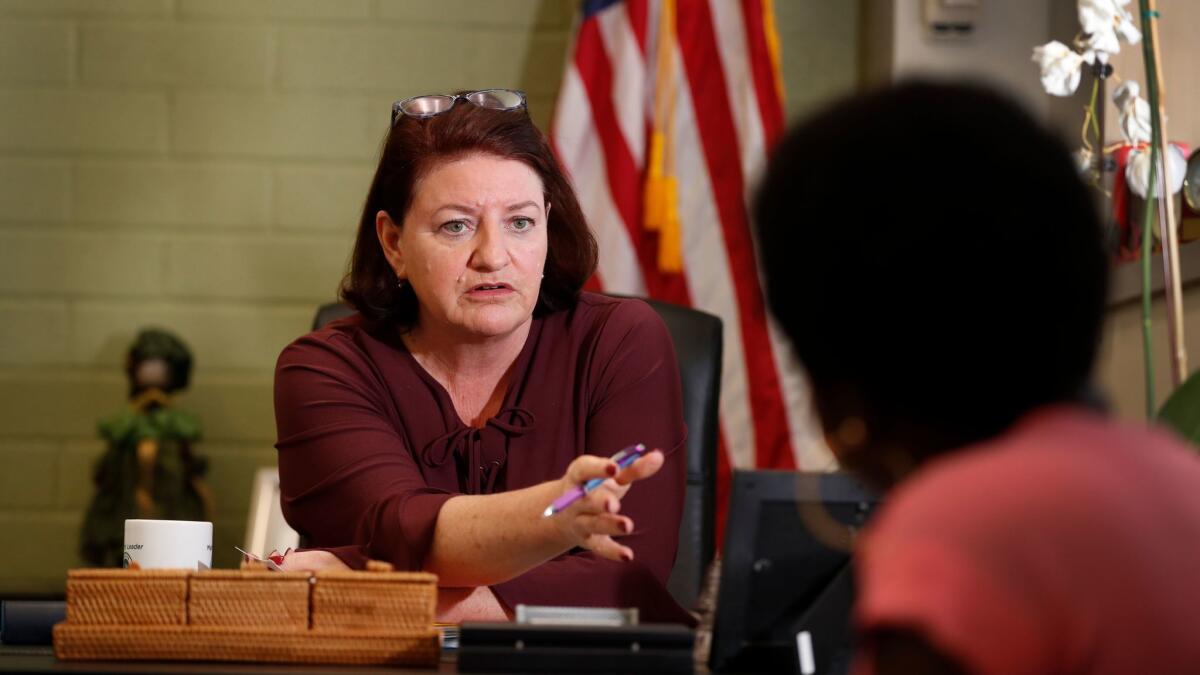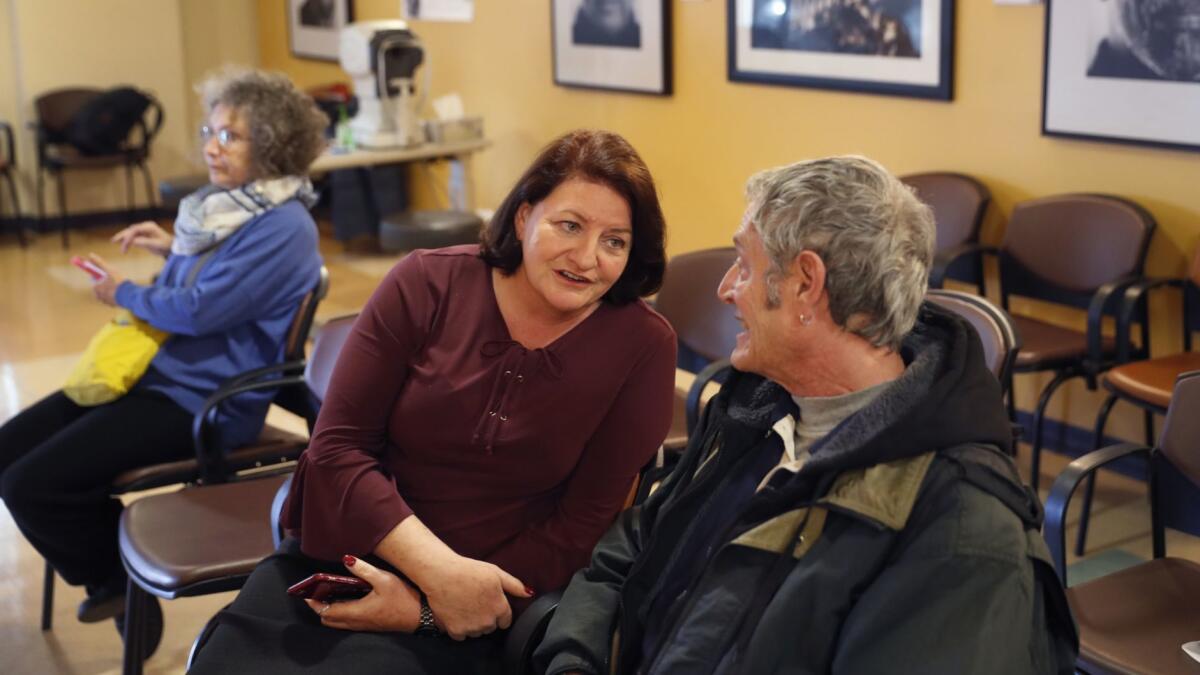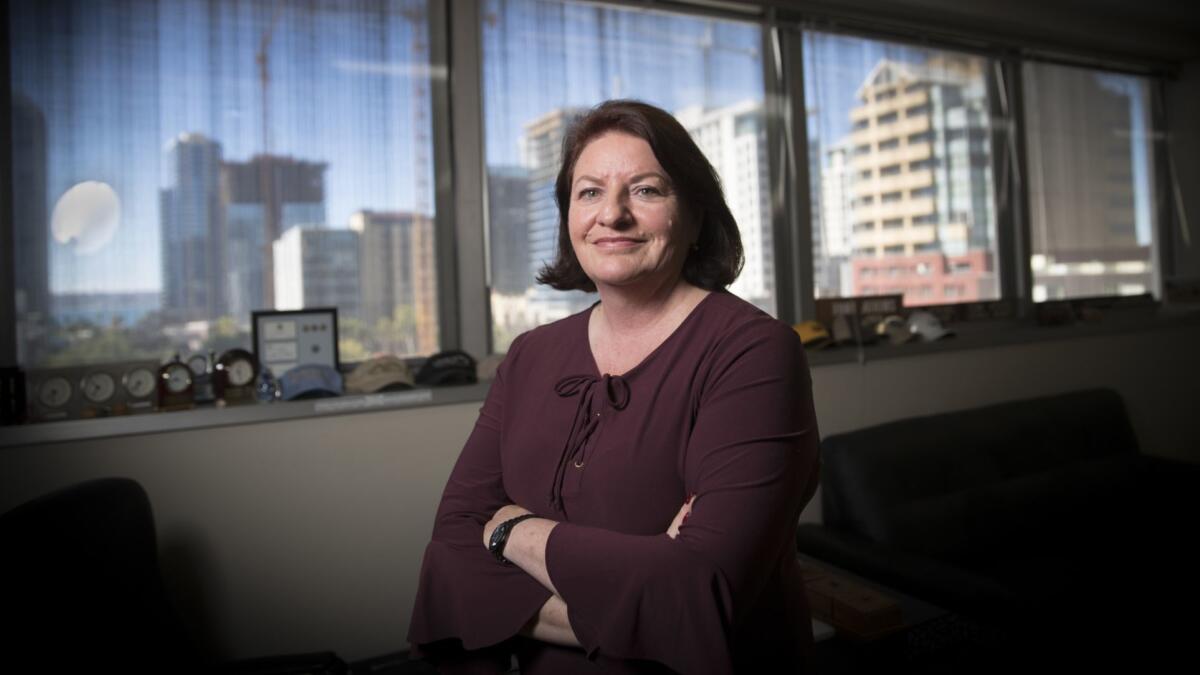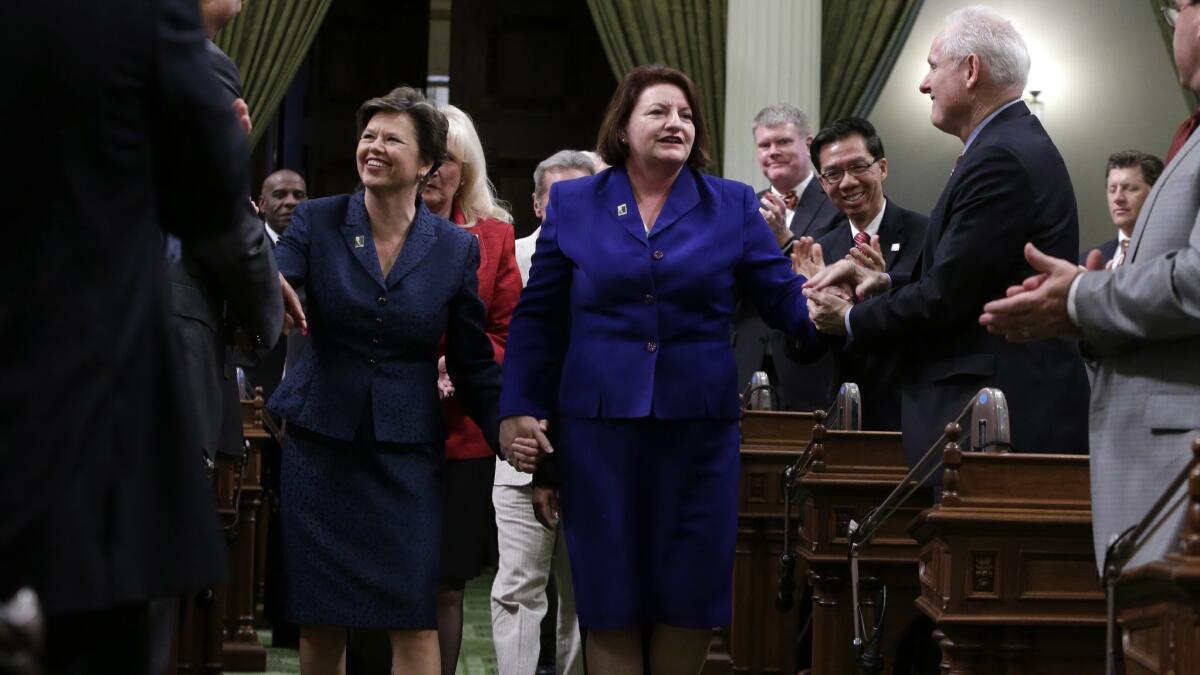Toni Atkins prepares to be first woman to have held the top job in both the California state Senate and Assembly

- Share via
The story that Toni Atkins tells feels less like anecdote than allegory, a glimpse of how as a legislator she confronts the problems of California using life lessons imported from her childhood in the mountains of southwestern Virginia.
During a weekday morning visit to a San Diego seniors center, Atkins praises the volunteers at a vision clinic offering free eye exams and glasses. After all, she knows a little something about being too poor to buy a pair of glasses.
By age 7, she was struggling to read and assigned to summer school after the second grade. It turned out the problem was her eyesight, undiagnosed because her family had no health insurance. The local Lions Club stepped in to give Atkins a pair of glasses.
“When I put on those glasses,” she tells the volunteers, “the first thing I did was I looked at the ground. I looked down and I saw for the first time how green the grass was. I just couldn’t believe it!”
Politicians routinely use their biography as a talking point. Less common is an elected official who uses it as a guiding principle when it comes time to govern.
“She translates it from the heart into policy,” said Paul Downey, chief executive of Serving Seniors, the nonprofit that hosted the vision clinic. “She’s able to relate and translate her experiences into something that is meaningful. And that’s rare.”
Rare, too, is the accomplishment Atkins will achieve on Wednesday: taking the oath as president pro tempore of the California Senate two years after serving as speaker of the Assembly . She’s the first legislator to hold both leadership posts since 1871. Atkins, 55, will make history, too, as the first woman and the first openly gay lawmaker to lead the upper house in Sacramento.
“From where I came from, to now be able to set the agenda and make sure that it includes a broader group of people, that’s really important,” Atkins told The Times.
That the 55-year old Democrat has twice found her way to the top of the state’s legislative leadership is a reflection, say those close to Atkins, of her skills in building a team and the self-confidence she displays in tackling challenges head-on.
“It is a strength that allows others to trust you and to follow you,” said Susan Bonilla, who served alongside Atkins for six years in the Assembly. “Trust is not a common word that you hear in political circles. It’s a very valuable thing.”
As she takes gavel, Atkins pledges to change culture of workplace behavior in Sacramento »


Atkins believes she was destined to live the California dream. Her father, James, was an Appalachian miner who’d been stationed in San Diego during World War II. The family was often entertained with stories about the “sleepy little town” on the Southern California coast.
“I always thought of it as the place to be,” she says.
Atkins arrived in 1985, a year after graduating from college. Her twin sister and brother-in-law were both in the Navy, and his deployment left a void in helping care for a newborn child. “Other people create 5- and 10-year plans,” she said. “I didn’t do that. I went where my heart took me.”
As she looked for work, Atkins sought ways to “channel the anger” left from the poverty of life in the mountain burg of Max Meadows, Va. As a child, Atkins says, being poor left her with a deep sense of shame.
“I felt like it must be our fault, but my parents worked harder than anyone I ever met,” she says. “When I went to college, I was angry.”
A favored professor encouraged Atkins to turn the anger into action. In San Diego, she took a job as director of a local women’s health clinic, inspired to protect women as angry protesters lined the streets. The ensuing battles took a toll, and she took respite in a job working for one of the city’s LGBTQ leaders, Christine Kehoe.
When Kehoe was elected to the City Council, Atkins joined her staff. She won a seat on the council herself in 2000 when Kehoe was elected to the Assembly. While there, Atkins championed San Diego’s “living wage” ordinance and briefly served as mayor during the city’s 2005 public employee pension crisis.
An interest in affordable housing — apropos for someone whose early childhood was in a home with no indoor plumbing — became a signature issue when Atkins was elected to the Assembly in 2010. Last year, her bill to help pay for low-income housing through a $75 fee on real estate transactions became law.

Few California communities are as ideologically integrated as San Diego, a blend of viewpoints offering valuable lessons for Atkins as she won the Assembly speakership in 2014. As leader, she fought for a new state tax credit for the working poor and pushed back against planned tuition hikes at the University of California.
Term limits, a maximum of six years in the Assembly when she was elected, placed an expiration date on Atkins’ leadership from the moment she was handed the gavel. And few Democrats, especially those elected under more-generous term limits enacted in 2012, had interest in falling in line behind a short-term leader. Less than 17 months later, a successor was chosen as Atkins turned her attention to a race for the state Senate — and a district that stretches from Coronado north to Solana Beach.
There, she joined a handful of Democrats with a shot at succeeding termed-out Senate President Pro Tem Kevin de León. The private politicking for the job came as Atkins also was lobbying colleagues on her housing proposal and a particularly thorny bill she co-authored — an effort to create a single-payer healthcare system.
“It put people in the Senate in a bind,” she says of the measure, which was sidelined last year for additional review because it didn’t fully identify a source for the funding.
The still hot embers of that firestorm will test Atkins’ new leadership of the Senate. The bill has become a shorthand for the internal battles in state Democratic politics, with leading statewide candidates and party activists still arguing whether to embrace the plan or start over. Atkins says she’s committed to continuing the conversation.
“Yes, I could have strained relationships,” she admits. “But I think people realize my intent was pure, not political.”
She will need to mend some of those relationships as Senate leader, formally given the title of president pro tempore — “for the time being” in Latin, a nod to the fact that California’s lieutenant governor is the permanent president of the Senate. She will oversee a workforce of close to 1,000 people while also advocating for her Democratic caucus. That includes an effort in June to stave off the recall of Orange County state Sen. Josh Newman (D-Fullerton).
Atkins wins praise for not only listening to opposing viewpoints but also for bearing witness to the impacts — good and bad — of decisions made in Sacramento.
“I want to be a bridge builder,” she tells a group of eight small-business owners gathered in a downtown San Diego conference room on a recent afternoon.
The business owners pull no punches in laying out their frustrations: confusing details on the state’s relatively new paid sick leave law, the high cost of workers’ compensation, their worries about the impacts of a broad tax overhaul plan kicking around at the state Capitol. Atkins takes notes throughout the conversation, promising to dig deeper into even the grievances rooted in local regulations.
As Senate leader, Atkins believes she can help keep the work in Sacramento focused on the practical impacts of public policy dilemmas.
“As hard as it was as speaker, the one thing that resonated with me was that I get to be at the table,” she says. “It has a bigger impact.”
Coverage of California politics »
One task demanding action will be how the Legislature should respond to troubling reports about sexual misconduct by lawmakers and staff. Some of the past incidents that have been disclosed happened on her watch as leader of the Assembly.
Atkins says she will not hesitate to call out behavior that’s inappropriate, and she was prepared to expel Tony Mendoza, the former state senator who instead resigned in the wake of improper-behavior allegations.
“I think we should be held to a higher standard. We've asked people to vote for us, they put their trust in us,” she says.
Whether Atkins feels unique pressure about becoming the Senate leader is unclear. She says the job of governing in any role has always weighed heavily.
“It’s my nature to be worried about everything,” she says.
Few would know it if they could see her stroll through San Diego’s South Park neighborhood. Atkins and her spouse, Jennifer LaSar, are often on the other end of the leash walking their dogs, Haley and Joey.
The senator easily switches gears from politics to what she loves about South Park: the little bistro with great coffee, the dive bar with Hank Williams Jr. on the jukebox.
“She’s stayed a real person,” said Sam Chammas, a San Diego restaurant owner who is a longtime friend. “I think that’s why people are drawn to her.”
Bonilla, the former legislator who became one of Atkins’ closest colleagues in Sacramento, said it’s the secret to her political success.
"She brings a lot of warmth and hospitality to people around her. You feel welcomed,” Bonilla said. “That’s an important trait in a leader."
So, too, is inspiration. For Atkins, it’s found in the stories of people and their struggles. At the mobile vision clinic, she says she learned something when an optometrist mentioned how blurry vision can sometimes lead to a diagnosis of diabetes — information that she may use to help buttress her support for a holistic approach to revamping healthcare.
“You pick up a gem here or there that you can make count,” Atkins says as she walks out of an eye-exam room. “That's what’s cool about this job.”
Follow @johnmyers on Twitter, sign up for our daily Essential Politics newsletter and listen to the weekly California Politics Podcast
Get the L.A. Times Politics newsletter
Deeply reported insights into legislation, politics and policy from Sacramento, Washington and beyond. In your inbox three times per week.
You may occasionally receive promotional content from the Los Angeles Times.








